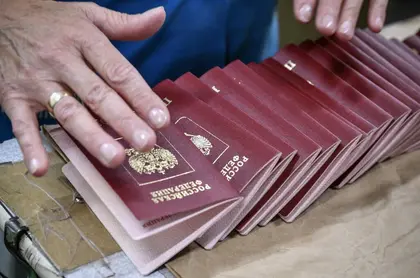When Moscow-installed authorities in the southeastern Ukrainian city of Melitopol began distributing Russian passports, mother-of-two Olesya Novitskaya did not hesitate.
“I think we will all live in Russia, and I need a Russian passport,” the 31-year-old makeup artist said in central Melitopol, holding her youngest son in her arms.
JOIN US ON TELEGRAM
Follow our coverage of the war on the @Kyivpost_official.
She spoke to AFP during a closely supervised press tour organized by the Russian defence ministry.
Currently on maternity leave, Novitskaya had come to apply for a Russian passport with her two young sons.
Novitskaya hopes she will be better off under Russian authorities, adding she often did not have enough money to buy diapers.
“Things in Ukraine were tough,” said Novitskaya, who was part of a queue of several dozen people applying for Russian papers.
Journalists were not allowed to move freely in the predominantly Russian-speaking city or interview locals without supervision.
In autumn the Moscow-installed authorities are hoping to organise a referendum on joining Russia.
Billboards across the city in the region of Zaporizhzhia are flashing Russian President Vladimir Putin’s promise that locals themselves will determine their future.
In a few weeks Novitskaya is expected to pledge allegiance to Moscow. The Russian anthem will be played in a small room decorated with a portrait of Putin. She will receive her Russian citizenship and a copy of the constitution.

EU Transfers €1.5 Bln Raised From Russian Assets for Ukraine
– ‘Everyone is divided’ –
Moscow-installed authorities have also been distributing Russian papers in other Russian-controlled Ukrainian territories in a move designed to make the occupation permanent.
Moscow’s campaign of Russification also includes the introduction of the Russian currency, plans to introduce the Russian school curriculum, and the launch of bus and train services between Moscow-annexed Crimea and the southern Ukrainian regions of Zaporizhzhia and Kherson.
Russian troops took control of the city in the early days of Moscow’s military intervention in Ukraine.
Compared to the devastated southern port city of Mariupol, Melitopol has been mostly spared the ravages of Russia’s intervention.
The Russian military presence in Melitopol is fairly light, and checkpoints installed at entry points into the city are flying Russian and Soviet flags.
Novitskaya said she had been waiting for Moscow’s arrival for years.
“Honestly, we expected this to happen in 2014,” she said, referring to the year when Moscow annexed the peninsula of Crimea from Ukraine and supported pro-Russian separatists in the east of the ex-Soviet country. But she admits that not everyone wants Russians to stay.
“Everyone now is divided — some are pro Russia, some are pro Ukraine,” she said.
The young woman identifies herself and her family as Russian, and said studying in Ukrainian was difficult for her eldest son, who is in primary school.
“I think it will be easier for him from now on,” she said. “We don’t speak Ukrainian.”
– ‘Everyone is afraid’ –
Damir Kadyrov, a 65-year-old pensioner, was equally enthusiastic.
He said he needed to get a Russian passport because Russia had come to stay.
“If Russia has come, then that’s it,” he said.
“Once they decided to destroy these fascists, things will be calm, like in Soviet times,” he said, echoing Moscow propaganda slogans that describe Ukrainian authorities as “Nazi” and “fascists”.
However not all residents of Melitopol, which had a population of some 150,000 people before the start of the offensive, share those views.
The head of the Moscow-installed administration, Yevgeny Balitsky, estimates that just around 20 to 30 Russian passports are distributed in the city every day and about 100 across the entire region.
“We are not happy with the pace yet,” he recently told reporters, noting that checks by the Russian security service, the FSB, were also slowing down the process.
A climate of distrust in the city is palpable.
Some locals continue to identify themselves as Ukrainians and support Kyiv authorities. Those who support Russia fear being seen as “collaborators”.
During the closely supervised press tour, many people did not want to speak on camera and left the queue.
Another Melitopol resident, Galina, said locals did not discuss the Moscow presence and the distribution of Russian passports.
“This is still a taboo,” the 58-year-old woman said, refusing to give her last name.
“Everyone is afraid.”
You can also highlight the text and press Ctrl + Enter






